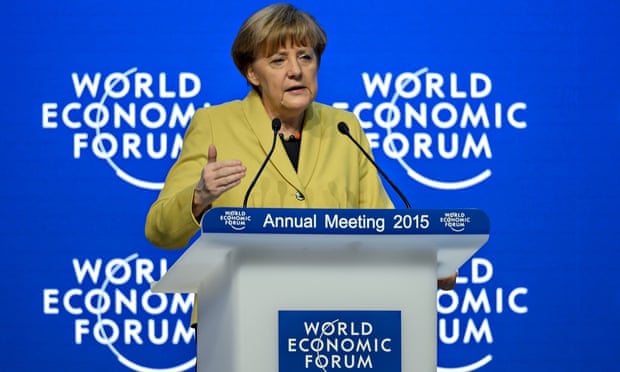Graeme Wearden in Davos Friday 23 January 2015
German chancellor signals Greek debt mountain must be repaid, during speech at World Economic Forum in Davos

Angela Merkel insisted that she wanted Greece to remain in the Eurozone. Photograph: Fabrice Coffrini/AFP/Getty Images
German chancellor Angela Merkel has warned Greece that it must take responsibility for its debts, as the country heads into crunch elections that could reignite the Eurozone debt crisis.
At a keynote speech at the World Economic Forum, Merkel insisted that she wanted Greece to remain in the Eurozone. But she also signalled to Athens that Germany was not easing up in its insistence that the Greek debt mountain is repaid.
“Everything we have done politically has been about Greece remaining in the euro area,” she told Davos. She cited two principles that underpin the Eurozone. “Showing solidarity, and continuing to show solidarity, along with the responsibility to shoulder one’s own risks,” she said.
But Merkel also acknowledged that Sunday’s poll could reshape the Eurozone, with the left-wing Syriza party leading the polls, and committed to securing a debt renegotiation.
“What happens after the elections, we will discuss then,” Merkel said.
Greece’s debts now total around 175% of GDP, a level which many experts believe is unsustainable. More than 30 economists wrote an open letter this week, urging its lenders to agree to debt relief.
But another northern European leader at Davos, Finland’s Alexander Stubb, was taking a tough line, saying the Greek people needed to know that it will be “very hard for us to forgive any loans or restructure any debt at this moment.”
Stubb suggested Greece faces three choices: to continue as things are; to endure a “continued period of instability” while discussing extensions to its existing borrowings; with the only other option being a “dirty exit” from the Eurozone.
Merkel was speaking as the European Central Bank announced its new €60bn-per-month (£46bn) quantitative easing programme, despite months of German resistance to the move. The German chancellor fears that this new stimulus package could encourage some European laggards to slacken their reform drives.
“Now is the time to do the homework with regards to your fiscal consolidation [before borrowing costs rise],” Merkel said. She clearly had France in mind, saying that Europe’s second-largest economy was only “on the way” to doing serious structural reforms.
Merkel also defended running a budget surplus, saying critics who claim Germany is tight with its money are forgetting its demographic challenges, with an aging population to care for.
She also spoke powerfully on the Ukraine crisis, condemning Moscow’s annexation of Ukraine as a clear and blatant violation of the territorial rights that are crucial to Europe.
Europe should not cut off the bridges built with Russia, but such a violation cannot simply be glossed over, she said.
Angela Merkel says Greece must take responsibility for its debts | World news | The Guardian
![The [Greek] European Tragedy](https://blogger.googleusercontent.com/img/b/R29vZ2xl/AVvXsEiWKI5s90SFm1wWTk6bs4p7CgslaC2SnYPsrZhb-B-smOufNNCSxCvpBLI9hOB-LsXZjir_PNmEiMk2-E62F3xkg96IoC6QFAaZAnPRTVH340IN9WBRmWJqPkjWlgyRj3zpALp7h6hvA58/s920/GkBack_new.jpg)